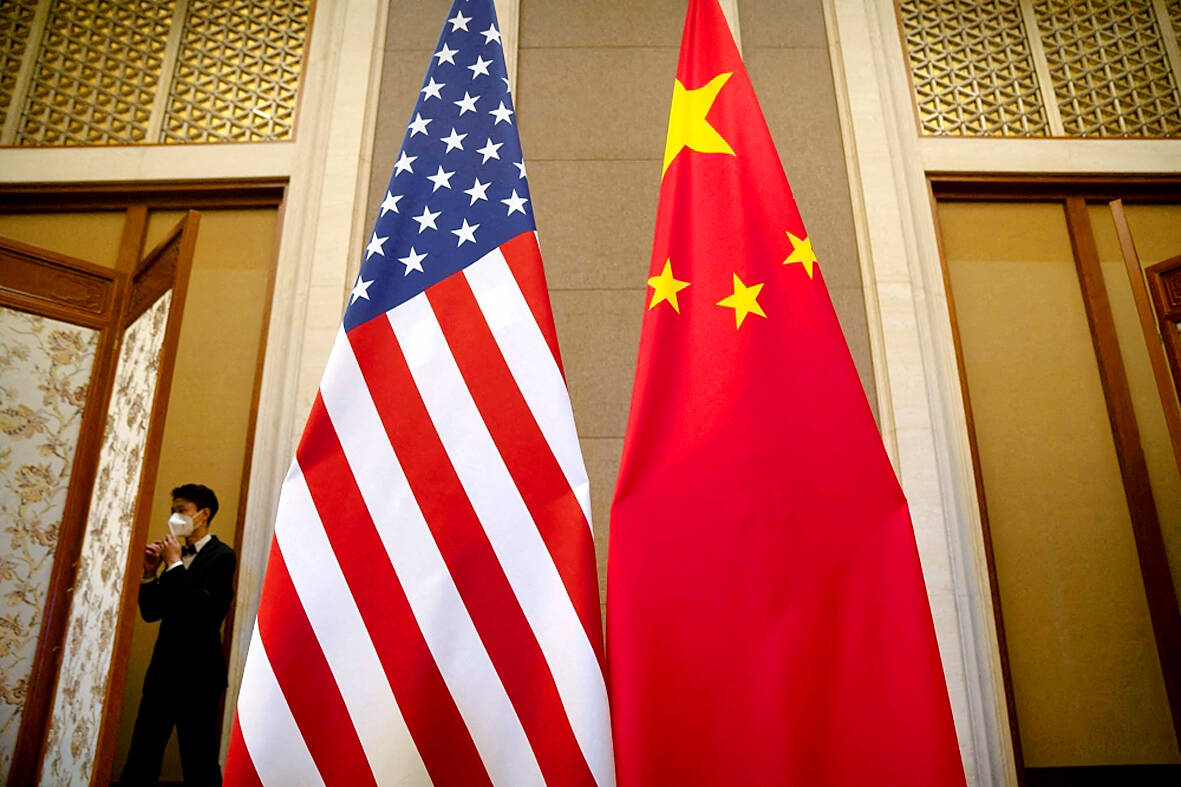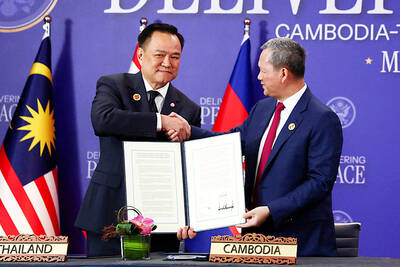China is intensifying a crackdown on alleged spies for the US, saying it found another case of an individual informing the CIA, adding to a series of espionage accusations between the two nations.
The Chinese Ministry of State Security yesterday said it is investigating a 39-year-old ministry official identified by his surname, Hao (郝), for providing information to the CIA in exchange for money. This follows another case earlier this month involving an employee of a military industrial group.
The latest claims come weeks after CIA Director William Burns said his agency has made progress in rebuilding its network in China following setbacks in the country. Tensions between China and the US have risen after a series of incidents in the past few months, including an alleged spy balloon and military encounters in the South China Sea.

Photo: REUTERS
The Chinese ministry provided rare details of how the people came to inform the CIA. It said Hao was approached by a US embassy staff known as Ted during his study in Japan. Ted introduced Hao to his colleague Li Jun, who worked for the CIA’s Tokyo office. Li asked Hao to work in a “core” unit upon his return to China, the ministry said in a statement.
Hao allegedly signed an espionage agreement with the US and received training. When he returned to China, he worked for a Chinese ministry — the statement did not specify which one — and met with CIA personnel several times, providing intelligence and receiving money in return, the ministry said.
The other case involved a suspect surnamed Zeng (曾), who developed a close relationship with Seth, an official of the US embassy in Italy, the Chinese ministry said.
Seth, who turned out to be working for the CIA in Rome, asked Zeng to provide sensitive military information and he agreed, it said, adding that Zeng provided a large amount of “core information” and received payment.
China’s powerful spy agency is usually secretive about its work, but has taken a more public profile recently. Beijing has ratcheted up efforts to crack down on spying and adopted a new counterespionage law that came into effect last month. That legislation expands the list of activities that could be considered spying, intensifying the risks for foreign firms.

Shamans in Peru on Monday gathered for an annual New Year’s ritual where they made predictions for the year to come, including illness for US President Donald Trump and the downfall of Venezuelan President Nicolas Maduro. “The United States should prepare itself because Donald Trump will fall seriously ill,” Juan de Dios Garcia proclaimed as he gathered with other shamans on a beach in southern Lima, dressed in traditional Andean ponchos and headdresses, and sprinkling flowers on the sand. The shamans carried large posters of world leaders, over which they crossed swords and burned incense, some of which they stomped on. In this

‘NO COUNTRY BUMPKIN’: The judge rejected arguments that former prime minister Najib Razak was an unwitting victim, saying Najib took steps to protect his position Imprisoned former Malaysian prime minister Najib Razak was yesterday convicted, following a corruption trial tied to multibillion-dollar looting of the 1Malaysia Development Berhad (1MDB) state investment fund. The nation’s high court found Najib, 72, guilty on four counts of abuse of power and 21 charges of money laundering related to more than US$700 million channeled into his personal bank accounts from the 1MDB fund. Najib denied any wrongdoing, and maintained the funds were a political donation from Saudi Arabia and that he had been misled by rogue financiers led by businessman Low Taek Jho. Low, thought to be the scandal’s mastermind, remains

Near the entrance to the Panama Canal, a monument to China’s contributions to the interoceanic waterway was torn down on Saturday night by order of local authorities. The move comes as US President Donald Trump has made threats in the past few months to retake control of the canal, claiming Beijing has too much influence in its operations. In a surprising move that has been criticized by leaders in Panama and China, the mayor’s office of the locality of Arraijan ordered the demolition of the monument built in 2004 to symbolize friendship between the countries. The mayor’s office said in

FIGHTING CONTINUES: Thai military dropped 40 bombs on border areas, Cambodia said, while Bangkok said Phnom Penh launched heavy attacks and damaged homes Cambodia yesterday accused Thailand of intensifying its bombardment of disputed border areas, even as officials from the two countries attend a multi-day meeting aimed at negotiating an end to deadly clashes. The neighbors’ long-standing border conflict reignited this month, shattering an earlier truce and killing more than 40 people, according to official counts. About 1 million people have also been displaced. Cambodian and Thai officials were in their third day of talks at a border checkpoint, with ministers of defense from the two countries scheduled to meet today. However, the Cambodian Ministry of National Defense said Thailand’s military carried out a heavy